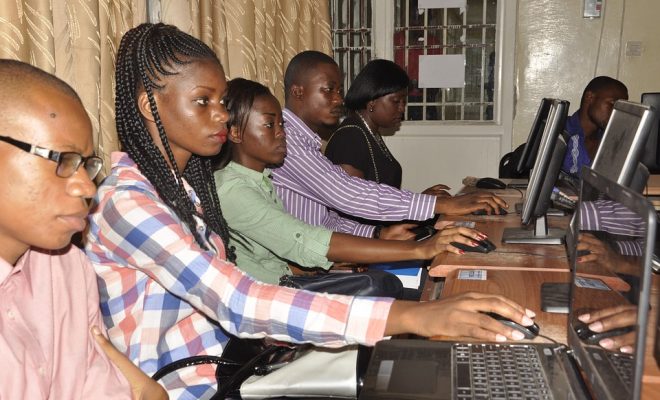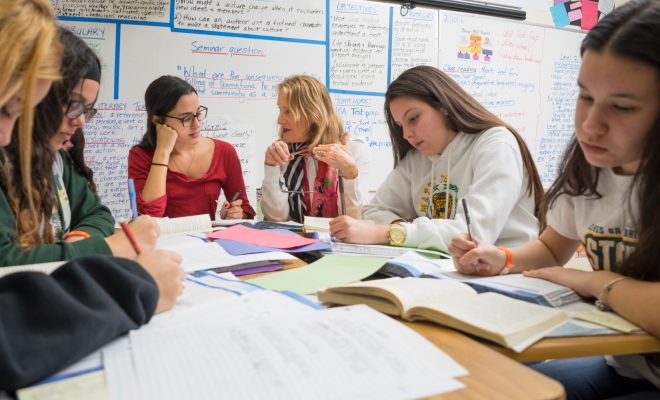6 Ways That HBCU’s Shined During 2015

Historically Black Colleges and Universities, or HBCUs, graduate just 3 percent of the total U.S. college population, but they account for 20 percent of all black college students earning degrees in the U.S. Around 34 percent of all HBCU students are considered low-income, regardless of race, contrasted with just 28 percent at other schools. Originally designed to give black Americans educational opportunities that weren’t available anywhere else, HBCUs now face an identity crisis amid rising competition from other college and university systems, including the increasing quality and offerings of community colleges and completely online institutions.
Despite grasping for a place at the table when it comes to American education, HBCUs are still an important component of U.S. college education and will remain vital to future generations of college-educated Americans. To demonstrate this, I am recounting six ways that HBCUs shined in 2015.
Bethune-Cookman University used grant to boost special education. Bethune-Cookman University in Daytona Beach, Florida, received a $1.25 million grant from the Office of Special Education and Rehabilitative Services, through the U.S. Department of Education, and launched a program called Project Child. The initiative aims to graduate 70 master-level special-education teachers through a fully online program to meet the growing demand for these educators.
The Council for Exceptional Children reported that there are 49 states, including Florida, with a shortage of teachers in classrooms where there are 600 million children or youth with disabilities.
According to The Daytona Beach News-Journal online, Willis Walter, dean of the school’s College of Education, said, “There is a critical shortage throughout the nation. And one of the ways that we’re hoping to assist with that battle is giving more students an incentive to go into the field.”
In an effort to bring in more students who want to pursue special education, Bethune-Cookman is offering a fully online master’s degree program. The $1.25 million grant will award scholarships to the program with a goal to recruit, retain, and graduate 70 master-level teachers.
Schools need to serve all children, and that includes students with disabilities. Unfortunately, the extreme shortage of special-education teachers makes this a challenge. We need more high-quality special-education teachers in our classrooms to help students with disabilities grow and develop and ultimately help place these students on the path to success.
I am ecstatic that Bethune-Cookman University has made an effort to increase the number of special education teachers in our country—special education is a necessary component of education. I hope that the online master’s program will generate excitement and result in a higher number of special-education graduates.
HBCU Lemoyne Owen College named first female president. Historically Black College and University LeMoyne-Owen College named Dr. Andrea Miller as its new president. The Memphis institution concluded a national search to replace outgoing president Johnnie Watson.
According HBCUBuzz.com, Miller is the first woman to lead the college and the 12th president in the school’s history. Miller formerly served as chancellor of Baton Rouge Community College in Louisiana. She attended LeMoyne in the 70s, graduating with a degree in biology, and she went on to attain her master’s and PhD from Atlanta University.
By way of theadvocate.com, Miller planned to focus on growing the college’s legacy of incubating student growth. “I look forward to embracing my alma mater’s shining legacy and helping the institution evolve in today’s higher education marketplace. I want LeMoyne-Owen College to continue to be for others what it was for me: a precious opportunity to learn, grow and eventually find purpose,” she said.
After facing financial issues, LeMoyne-Owen has grown over the last five years. HBCUBuzz’s article on Miller’s selection as president noted that the college “opened a new $13.5 million residence hall in 2013” and has emerged well from the money troubles that dogged it in the late aughts.
Miller’s tenure as president began on September 1st of this year.
I look forward to seeing what Dr. Miller accomplishes at LeMoyne-Owen College and how her appointment advances both minority and women issues on campus, and in the community at large.
Dillard University nominated for 6 HBCU awards. Dillard University in Louisiana has always been known as one of the nation’s best HBCUs, and the institution for higher education’s nomination for a number of awards at the HBCU National Media Summit came as no surprise.. According to The Times-Picayune and NOLA.com, of all the Lousiana HBCUs nominated for awards, Dillard received the most.
The university’s president, Walter Kimbrough, was nominated for Male President of the Year, and the school was also nominated for Best Choir and Best Fine Arts Program. In addition to President Kimbrough, choir, and fine arts, Dillard was nominated for “Best Science, Techonology, Engineering and Mathematics (STEM) program (Physics); Female Faculty of the Year (Kemberley Washington); and Male Alumnus of the Years (Michael Jones, ’82.).”
The awards took place in Virginia on the campus of Hampton University in early July. NOLA.com reported that “proceeds from the ceremony will go the Center for HBCU Media Advocacy, a nonprofit that supports HBCU’s through media exposure and education.”
Other HBCUs from Louisiana that were nominated for awards were Xavier and Southern University.
Though it did not win all its categories, these nominations were great news for Dillard as they will surely shine a bright spotlight on how well the university is doing. Heralded as one of the best liberal arts colleges in the south, the nominations that Dillard received prove its worth. Honors like this are important time for HBCUs as they increasingly compete with online degree programs and an increasing quality of community college offerings. Congratulations to Dillard and the other HBCUs that were nominated and/or won.
FAMU won big at AARP awards. The good news continued to roll in for Florida Agriculture and Mechanical University after the school’s SGA president, Tonnette Graham, was named chairwoman of the Florida Student Association.
FAMU President Elmira Mangum was awarded HBCU ‘President of the Year’ at the AARP HBCU Awards at Hampton University.
“Florida Agricultural and Mechanical University (FAMU) President Elmira Mangum, Ph.D., was awarded the prestigious Historically Black Colleges and Universities (HBCU) ‘Female President of the Year’ Award, presented by the HBCU Digest […] at the annual AARP HBCU Awards ceremony at Hampton University,” said a report from WCTV.tv.
Magnum’s presence has been good for the university. The article further stateed how well she’s been received and awarded this past year. In addition to receiving this award, she was also honored at the Onyx Awards, named to the USDA Agricultural Policy Advisory Committee (APAC), and placed on EBONY magazine’s list of 100 powerful people.
In conjunction with Magnum’s good news, FAMU was named the top HBCU in the nation by U.S. News and World Report. That’s a pretty big deal.
This news will surely be used to lure more students to the prestigious university. Hosting a president of the year and laying claim to be the best HBCU in the nation isn’t a bad thing to brag about. The accomplishments of schools like FAMU, particularly ones that attract news attention, are good for all HBCUs because they lift the credibility, relevance, and overall name recognition of the schools. Congrats to President Graham and FAMU.
White House celebrated HBCU Week. This year, the White House hosted HBCU Week to discuss the future of Historically Black Colleges and Universities.
Vice President Joe Biden spoke on those gathered regarding the role that HBCUs play in America’s economy: “The people who were once left out have to be brought in. One of the ways to accomplish this is to make sure we have the best-educated, most-skilled workforce in the world.”
Biden also noted that many volunteers from his first campaign for Senate were from Delaware State University, an HBCU he leaned on for support.
In addition to talking about the importance of sustaining HBCUs, Biden spoke of what the Obama administration has done to aid in their financial success, stating that the federal government invests about $1 billion into the collection of colleges each year.
But there is still work to be done regarding the health of many HBCUs. Some are facing financial ruin, and others are teetering on the edge of collapse. There seems to be a widespread belief that HBCUs are losing their relevancy and place in the greater college landscape. I’ve written before about how I feel this train of thought is flawed and dangerous to higher education as whole in the country, as well as how HBCUs still serve a much-needed student population.
This conference surely helped to quell some of those fears as the White House works to reassure leaders that they are there to support and ensure that HBCUs are here to stay.
HBCU students better prepared after graduation than peers. A Gallup-USA Funds Minority College Graduates Report showed that “HBCU graduates are more likely to prosper after graduation than students who graduate from non-HBCUs.”
The news came at an opportune time as HBCUs were under scrutiny for effectiveness and discussions were being held about whether black students were better served by attending Predominately White Institutions (PWI).
Some HBCUs are struggling to survive due to debt, but this report showed that what is produced at America’s predominately black colleges and universities is pretty good. For anyone who has been lauding the relevancy of HBCUs for some time now (like me), this is music to our ears.
The study found that over 50 percent of HBCU graduates who were surveyed viewed their prospects after graduation as positive while just under 30 percent of black graduates from PWIs viewed them as positive. Again–all good news for soon-to-be graduates and for the health of HBCUs. Of course, there is always a ‘but’ when studies are released.
“The report found that four in 10 black HBCU graduates are more likely to thrive financially while fewer than three in 10 black graduates of other schools can say the same.” That news is likely tied to the overall health of the economy and how graduates may find their place in an ever changing workforce. I’m not sure what the definition of “thrive” is in this case, however. There is a difference, I think, between being comfortable and being affluent.
Overall, though, this news is great for HBCUs and the students who attend them. The report found that graduates from HBCUs are better emotionally, have stronger relationships, and are more goal oriented as well than their PWI counterparts.
Can you think of additional ways that HBCUs shined in 2015?
Read all of our posts about HBCUs by clicking here.




